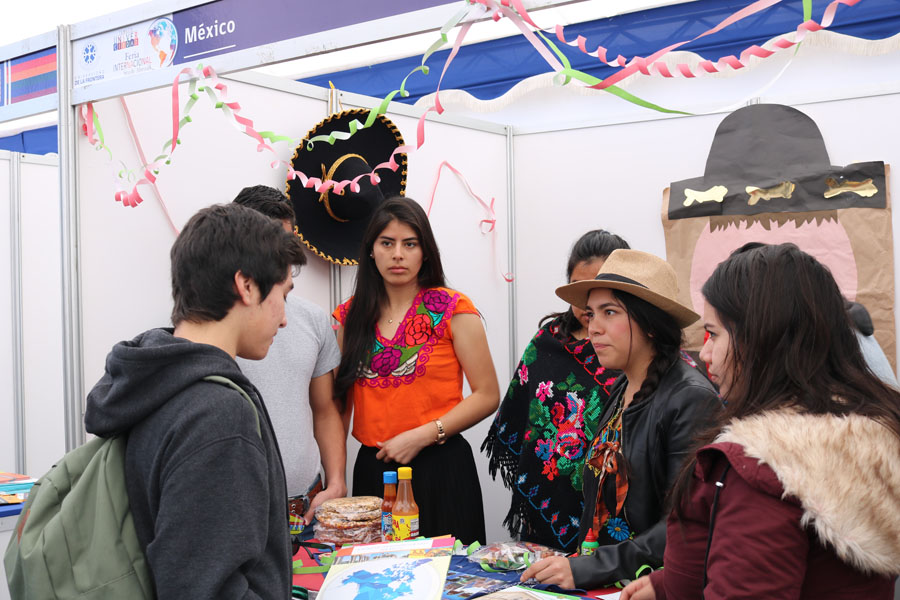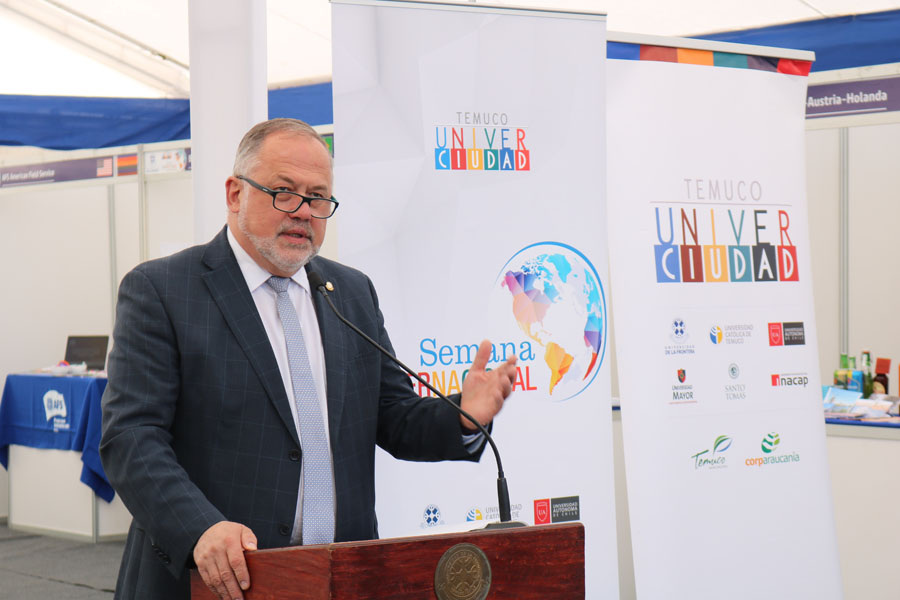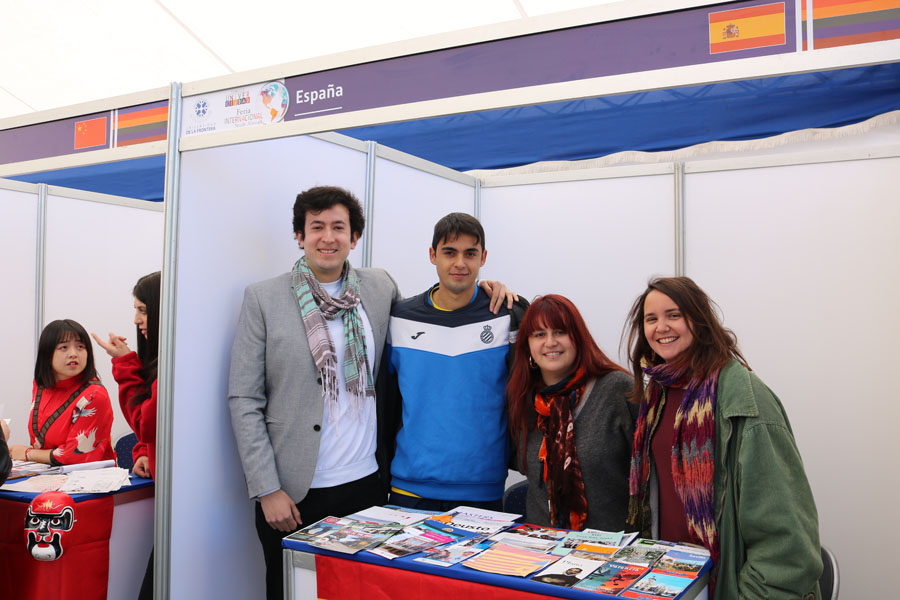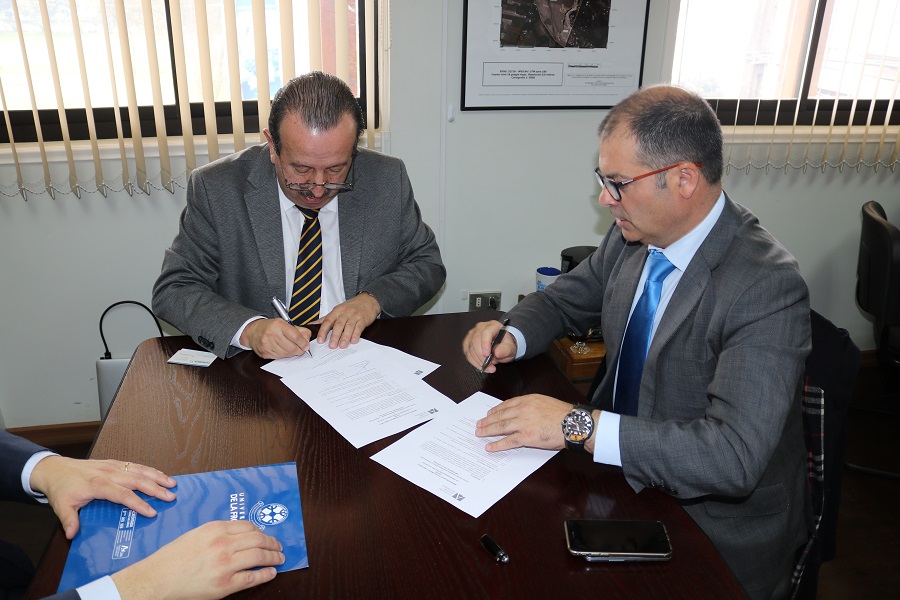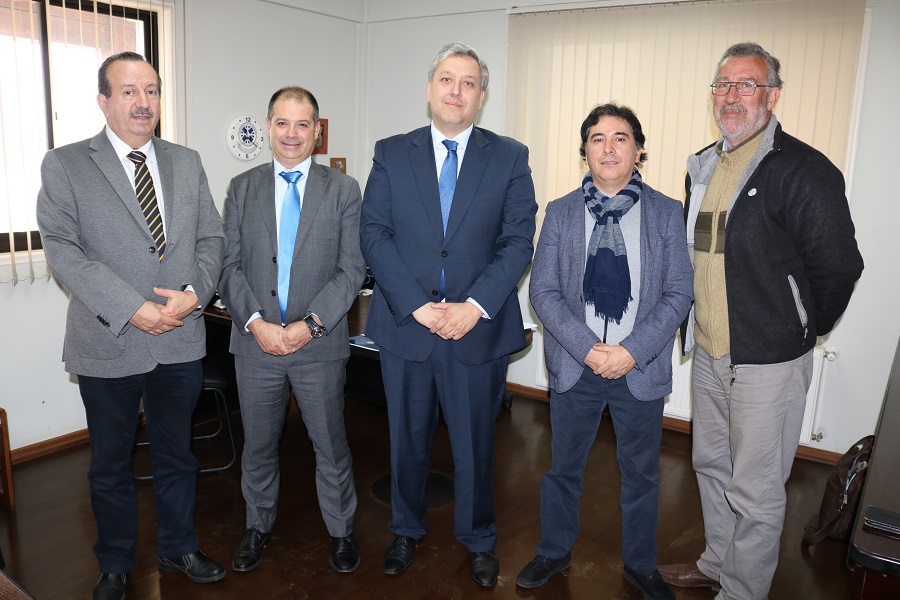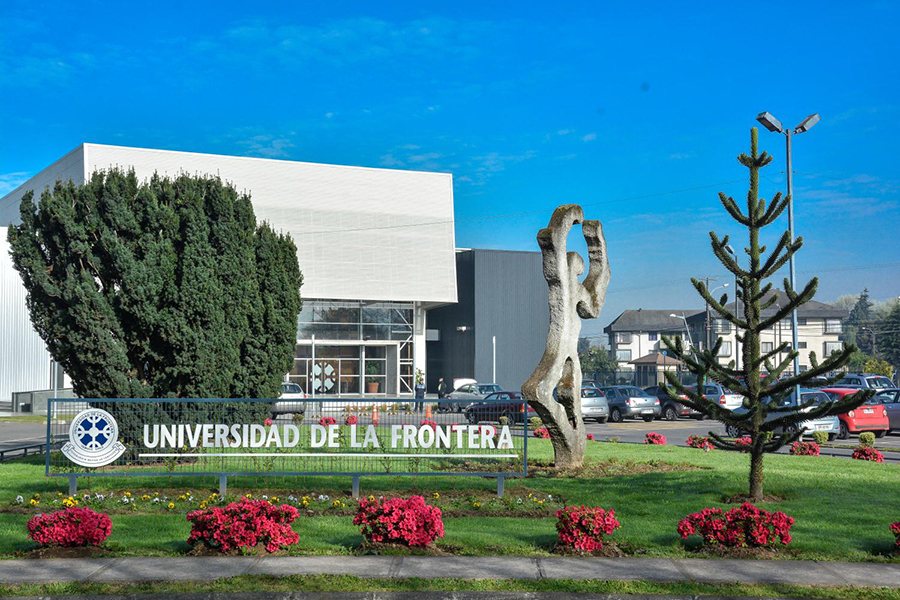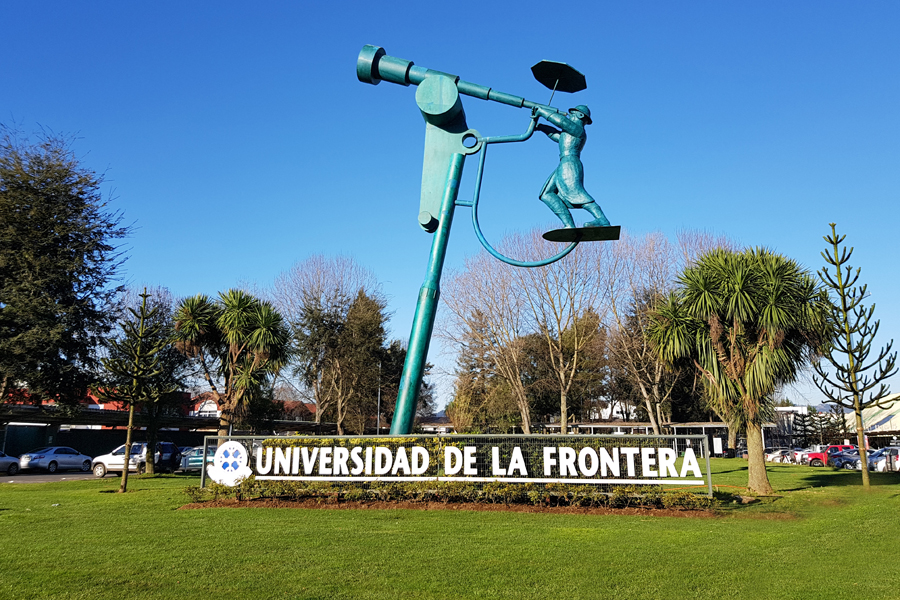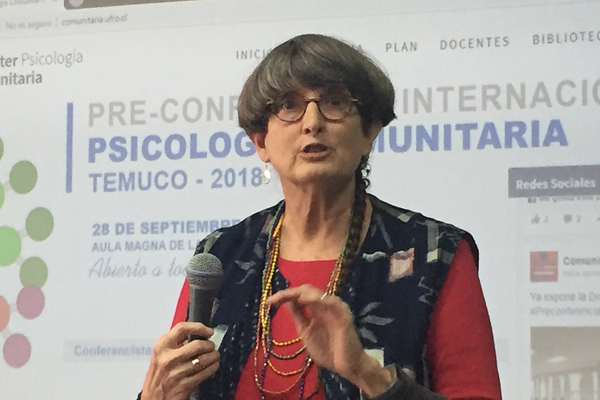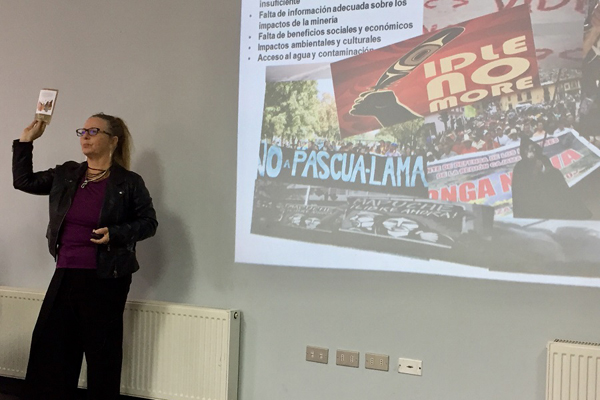|
Within the “International Week”, organized by UniverCiudad, the UFRO received different foreign agencies and universities in order to present their academic offer and programs to strengthen student mobility. |
The possibility of spending a semester abroad is definitely an enriching experience that makes a difference in the training of university students, as well as in their personal development. Therefore, being aware of the benefits of student mobility, the alliance of regional universities called UniverCiudad (UniverCity) Temuco started the “International Week” last Monday at the Campus of the Universidad de La Frontera with the “Study Abroad” Fair, which was organized by the International Affairs Office and the Student Mobility Office. It was the third version of the “Study Abroad” Fair that took place on Monday, 22nd of October, with the objective of increasing the number of students who go to other countries. The Fair brought more than a dozen international universities and agencies for exchange from the USA, Spain, France, Belgium, China, Mexico and other countries together to show the students the different opportunities to study abroad. The Fair was inaugurated by the Rector of the UFRO, Dr. Eduardo Hebel Weiss, who emphasized the need to seek for the internationalization of this institution. “The interaction with students of different countries is an enrichment for everyone, from a personal, ethical, moral and value-based point of view. Therefore, student exchange is very important for the comparison of educational systems, curricula, the student-teacher relationship and that this information is transmitted, because internationalization is a motive for change,” Hebel said. The head of the UFRO National and International Student Mobility Office, Antonia Espinoza, also shared this opinion and specified that this higher education institution has a great index of student mobility, with high numbers in applications for scholarships. Apart from that, at the regional level, the UFRO is the institution which sent the most undergraduate students to other countries and also received 75 foreign students in the first semester of 2018. “Our work of internationalization as a university is very important, since we offer opportunities of growth to our students. We want to show them the advantages of studying abroad, getting to know other communities and universities for the internationalization of everyone,” she commented. One example for that is Stefan Valentin, a student in Mathematics Education at the Universidad de La Frontera who spent a semester at the Universidad de Huelva in Spain in 2017. “It was a thorough experience that gave me the opportunity to get to know other ways of life and cultures and to join a university at which I felt very welcome. I was also able to get to know new contents my study program does not offer, such as the inclusive education class that has become an important issue for this country,” he said.  Written by: Cristián Arriagada Written by: Cristián ArriagadaCommunications Office |
|
This strategic alliance plans modalities for student exchange and possible double-graduation programs. |
With a clear international outlook and an increased number of foreign students, the European University of the Atlantic in Spain is the most recent institution that established a Cooperation Agreement with the Faculty of Agricultural and Forestry Science of the Universidad de La Frontera. The European University of the Atlantic is located in Santander in the north of Spain and has three faculties, more than 2 thousand undergraduate students and about 5 thousand postgraduate students. The objective of this agreement with the UFRO, through the Faculty of Agricultural and Forestry Science, is to strengthen the exchange of students in related fields and the elaboration of a double degree program. Apart from that, it also considers the development of academic and professional programs, the exchange of publications on research reports and the exchange of academic staff and specialists in the fields of their academic, research and/or professional competencies. “We are very enthusiastic about students coming to study at our institution and students from our institution going to study at the UFRO or even getting a double degree. The objective is to be linked between universities and to deepen in possible ways of cooperation, projects, or R&D&I”, Rubén Calderón Iglesias, rector of the European University of the Atlantic, said. At the moment, both higher education institutions have to work on the analysis of structure equivalence of undergraduate, master´s and doctoral programs. All that with the aim of reaching a more precise and concrete partnership. One of the key factors in the draft for this cooperation was the Ibero-American University Foundation whose director, Pablo Eisendecher, was present at the signing of the agreement. “It is very important for us that the number of foreign students is as high as possible and that they come from as many countries as possible. The idea is to create cross-disciplinary skills”, Calderón added. The European University of the Atlantic was founded in 2012 and offers four programs that are oriented towards the field of food science. One of them is the program in Engineering of Food and Agriculture Industries, from which this cooperation with the Universidad de la Frontera started. “As a faculty we keep moving towards internationalization and we are strongly convinced that this is the way to go since we have been able to confirm the results, especially regarding our undergraduate programs,” Rodolfo Pihán, the dean of the Faculty of Agricultural and Forestry Science, explained.
 Written by: Sergio Valenzuela Written by: Sergio ValenzuelaCommunications Office |
|
The items that were evaluated best are Accreditation with 86.2% and Research with 78.4%. Nine UFRO programs are among the top ten in Chile. Nursing and Nutrition are in third place among 34 national universities. These figures made it possible that this institution climbed from place 13 last year to place 11 in the report 2018. |
The Universidad de La Frontera climbed from place 13 to 11 according to the report of the América Economía Ranking 2018. Mainly, this achievement is the result of systematic work and the determination this educational institution has in order to keep improving each day. According to information from the Division of Analysis and Institutional Development (DADI), one of the reasons the UFRO climbed up is that the indicators Teaching Quality and University Life improved. In this regard, the ranking positively takes the areas for sports and physical activity into account, such as sports courts, gyms, athletic tracks, besides of all activities that are linked with sports and the students´ recreation. The dimensions the Ranking considered are: Teaching Quality, Student Quality, Research, Accreditation, Infrastructure and Efficiency, Internationalization, Inclusion and Diversity, Community Outreach, and University Life. ACCREDITATION AND RESEARCH Another important indicator is Accreditation in which the academic offer of this educational institution is among the ones with the highest ratings, as well as the Universidad de Talca and the Universidad de los Andes. The item Research, although it has had a decrease compared to last year by almost three points, keeps being within the ones with the best average and has an even better score than most of the other top ten universities. The Universidad de La Frontera´s researchers´ work also shows in the large number of WOS publications – a total of 1570 – between 2014 and 2016. LEADING UNDERGRADUATE PROGRAMS Nursing and Nutrition are in third place out of 34 judged universities, with excellent indicators of seven and six years of accreditation, apart from a strong academic body and an employment rate of 99% in the case of the Nursing program. RANKING OF THE UNDERGRADUATE PROGRAMS The América Economía Ranking analyzed 16 undergraduate programs at 34 universities. The UFRO programs that achieved to be among the top 10 are: Agronomy, Nursing, Civil Industrial Engineering, Medicine, Nutrition and Dietetics, Dentistry, Psychology, Sociology and Civil Electrical Engineering. FUTURE IMPROVEMENTS It is important to note that there are aspects that have to be improved. Mainly, the item Community Outreach, which has the weakest score in the report. According to Dr. Ricardo Herrera, director of DADI, this indicator clearly shows where to put more efforts. “This is an invitation to non-compliance, to keep working, particularly on the contact and link with the community of Temuco and our region. This is not about working in order to appear in the rankings. It is about knowing with certainty in which field we have to work harder. Simultaneously, we have to keep strengthening research as one of the keys for growth.” The Psychology and Dentistry programs, both among the top five in relation to the simile at the national level, have a common denominator with a low score: the item Prestige. This item is based on the survey that has been randomly sent to a group of university professors of each institution. The scores on this item are between 10 and 27 points, except for the Sociology program which, although being in the eighth position with respect to the top ten, marks a score of 35.5. For the purpose of this report, the item Prestige is weighted by 20% and it is of crucial importance that the academics who receive this survey each year answer in a way that evaluates and recognizes the programs by the work that has been done.  Written by: Division of Analysis and Institutional Developments Written by: Division of Analysis and Institutional Developments |
|
It is a milestone in the history of accreditation for regional state universities and a mayor success for the Araucanía Region. |
The Universidad de La Frontera is accredited for 6 years and achieved to enter the group of universities of excellence, a category that includes all institutions that are accredited for 6 or 7 years.  Written by: Communications Office Written by: Communications Office |
|
Indigenous rights, the relation between the extractive industry and the loss of a national identity, psychology as an agent of change in disaster situations – these were some of the issues presented in the International Pre-conference of Community Psychology at the Universidad de La Frontera. |
Five renowned professionals were present in this event, which was the prelude for the seventh International Conference of Community Psychology in Santiago on October 4th to 7th. Apart from presenting the most recent results of their research work, they contributed to the debate that just started in our region after the launch of the Araukanía Promotion Plan. The event is the result of the efforts of the Universidad de La Frontera, Temuco Catholic University and University of Santo Tomás and they brought Dr. Terry Mitchell, an academic of the Wilfried Laurier University in Canada, Dr. Brinton Lykes of the Boston College in the USA, Irma Serrano and David Pérez Jiménez from Puerto Rico and the Cuban psychologist Carmen Nora Hernández to the UFRO in order to participate in seminars, workshops, conversations, and visits to the Mapuche Community, between September 29th and October 2nd. They participated in the practice-based seminar “Social coexistence and human rights: contributions from community psychology”, which was the inaugural event of this Pre-conference of Community Psychology. Dr. Mitchell, who was recently honored for her contribution to the study on indigenous rights in the Canadian context, was one of the speakers and gave an account of the increase in deaths of indigenous leaders while defending their territories. This was one of the conclusions presented at the conference “Indigenous rights and community psychology: Historical traumas and extractive projects”, a topic that, according to Dr. Mireya Palavecinos, director of the UFRO Master´s Program in Community Psychology, “is very important regarding the very contingent facts that take place these days in our country, and especially in our region considering the Araukanía Promotion Plan, which has just been presented and which poses a number of challenges regarding productive issues as well as the relationship with the Mapuche People. Canada is very advanced in this point.” The series of expositions showed the reality of community psychology as a special discipline in the treatment of social situations that get complex according to the local realities. One of those expositions was about gender-based violence, presented by Dr. Lykes, or the consequences Puerto Rico had to deal with after Hurricane María and that affected its population of almost three million people, or the political reality in Cuba after opening up to the US market. It was an academic event that brought professionals in social science and community leaders together and that fulfilled the objective of decentralizing the 7th International Conference of Community Psychology. It brought the Chilean Society of Community Psychology and a network of academic teams from 16 Chilean universities, which has been operating in Chile for more than 10 years and includes the Universidad de La Frontera, to our region. Apart from that, considering that in the 90´s new social problems came up in Chile which challenged psychology, such as discrimination, children´s rights, or policies for people living in extreme poverty, the psychologists started to work in multidisciplinary work teams in programs that permitted them to work in direct contact with the affected families. And, today, they have the UFRO in the south, as a reference for the work with vulnerable sectors and the creation of human capital regarding prevention and the development of public policies which are dealing with these issues.
|





